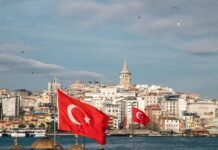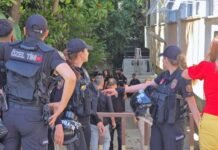Turkey’s mainstream news channels NTV, Habertürk and CNN Türk failed to broadcast the first election rally of main opposition Republican People’s Party (CHP) presidential candidate Muharrem İnce.
According to a report by online news outlet Ahval, Turkey’s biggest private media organisation, CNN Türk, was officially handed over to its staunchly pro-government new owners in early April, and since then personnel changes have been taking place. Other news networks NTV and Habertürk have become pro-government broadcasting outlets in recent years despite their secular background.
Many on social media criticised the censorship of İnce. A CHP deputy mentioned the TV channels on Twitter and asked whether they would broadcast the rally or not. “You hid the presidential candidate of the second largest party in Parliament from the nation,” one Twitter user said.
“Don’t say you heard it from me, but Muharrem İnce held a rally today. Let me inform you, dear news channels,” another said.
İnce also called on public broadcaster Turkish Radio and Television Corporation (TRT) on Saturday to broadcast his campaign rallies, warning that he would go to their offices with 130 members of parliament to protest if TRT continues to discriminate against him and his gatherings.
“We had a rally in Yalova. I have not seen such a thing in Yalova in the last 40 years. But TRT didn’t broadcast it. This is my final warning. I will not repeat it. TRT is not your father’s farm. TRT belongs to 80 million people,” said İnce during an election rally in Balıkesir on Saturday.
Recalling that TRT is funded by taxpayer money, İnce said, “If you keep doing this, then don’t take the taxes for TRT from the electric bills of CHP supporters.”
“If our rallies today are not broadcast, I’m telling you that I will go to TRT with 130 members of parliament next week. Don’t run away.”
Media coverage of the election campaigns of current President Recep Tayyip Erdoğan and his ruling Justice and Development Party (AKP) and opposition leaders and parties in recent years has been strongly criticized. A report on March 28 on the media coverage of political parties revealed that pro-Kurdish Peoples’ Democratic Party (HDP) members have not been invited to appear on news stations NTV, CNN Türk and Habertürk and that no HDP parliamentary group meetings have been aired since March 17, 2015.
During the last such meeting broadcast by the top TV news channels, the HDP’s then-Co-chairperson Selahattin Demirtaş said they would not allow then-Prime Minister Erdoğan to become president. Demirtaş has been in prison since Nov. 4, 2016.
The report also revealed that as of March 28, no HDP members had appeared as guests on CNN Türk for 650 days, NTV for 883 days and Habertürk for 751 days.
The HDP was only allotted three hours on state-run TRT during the April 1-June 7, 2015 election campaign period, while Erdoğan’s ruling AKP appeared for 188 hours, the main opposition CHP for 14 hours and the Nationalist Movement Party (MHP) 7.5 hours. In the same period private TV channels A Haber, ATV, Kanal 24, Beyaz TV, Ülke TV, TGRT, Kanal 7 and Kanal A covered the HDP for a total of 492 minutes, but 415 of them were taken up by anti-HDP propaganda.
During the campaign leading up to the Nov. 1, 2015 elections, TRT and 12 national TV channels aired AKP Chairman Ahmet Davutoğlu for 310 hours, CHP Chairman Kemal Kılıçdaroğlu for 44 hours, MHP leader Devlet Bahçeli for 29 hours and HDP Co-chairperson Demirtaş for six hours.
According to the report, President Erdoğan appeared for 806 hours on 12 TV news channels in the month prior to a referendum on April 1, 2017, while the CHP appeared for 480 hours, the MHP for 24.5 hours and the HDP just 58 minutes.
Meanwhile, an interview with CHP candidate İnce to be published on Sunday in the pro-government Hürriyet daily was cancelled at the last minute by the newspaper’s administration, Odatv reported on Saturday.
Hürriyet, once known as the flagship of the Turkish press, belongs to Doğan Media, which was bought by the pro-government Demirören Group in March.
Odatv also reported that the executives of CNN Türk, also belonging to the same group, were unhappy with the channel broadcasting a CHP ceremony on Friday during which the party announced İnce’s candidacy. The channel did not broadcast İnce’s first election rally today.
CNN Türk parted ways with general director Erdoğan Aktaş on Friday, media news site Medyatava reported. According to Medyatava, Bora Bayraktar, a veteran journalist and a Middle East expert, will be the new general director of the news channel, belonging to Doğan Media, which was bought by the pro-government Demirören Group in March.
Before transferring to CNN Türk in 2015, Aktaş was working as the general director of the aHaber news channel, belonging to the pro-government Turkuaz Group.
His likely successor, Bayraktar, early this year shared a tweet with a picture of famous actor Ben Affleck in military uniform, claiming that the person in the picture was Eddie Brandon from the US Special Forces, who was killed during Turkey’s military offensive in Syria when fighting alongside Kurdish militia. “See who Turkey is against, who it fights,” Bayraktar tweeted. Bayraktar’s Twitter account @Bora_Bayraktar is currently inactive.
Turkey is ranked 157th among 180 countries in the 2018 World Press Freedom Index released by Reporters Without Borders (RSF) on Wednesday. If Turkey falls two more places, it will make it to the list of countries on the blacklist, which have the poorest record in press freedom.
Turkey is the biggest jailer of journalists in the world. The most recent figures documented by SCF show that 254 journalists and media workers were in jail as of May 3, 2018, most in pretrial detention. Of those in prison 192 were under arrest pending trial while only 62 journalists have been convicted and are serving their time. Detention warrants are outstanding for 142 journalists who are living in exile or remain at large in Turkey.
Detaining tens of thousands of people over alleged links to the Gülen movement, the government also closed down about 200 media outlets, including Kurdish TVs and papers, after a coup attempt in Turkey on July 15, 2016.
















[…] Source link […]
[…] Recep Tayyip Erdogan’s Justice and Development party (AKP), the Stockholm Center for Freedom reported. Ince and others in Turkey have decried how these outlets promote AKP by not giving much airtime to […]
[…] Recep Tayyip Erdogan’s Justice and Development party (AKP), the Stockholm Center for Freedom reported. Ince and others in Turkey have decried how these outlets promote AKP by not giving much airtime to […]
[…] Recep Tayyip Erdogan’s Justice and Development party (AKP), the Stockholm Center for Freedom reported. Ince and others in Turkey have decried how these outlets promote AKP by not giving much airtime to […]
[…] Recep Tayyip Erdogan’s Justice and Development party (AKP), the Stockholm Center for Freedom reported. Ince and others in Turkey have decried how these outlets promote AKP by not giving much airtime to […]
[…] Recep Tayyip Erdogan’s Justice and Development party (AKP), the Stockholm Center for Freedom reported. Ince and others in Turkey have decried how these outlets promote AKP by not giving much airtime to […]